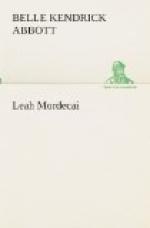“I determined I would tell you all, Lizzie, before we parted, and ask your advice. Yes, I think I do love Emile—love him, because he says he loves me. Last night he urged me again to become his wife. I trembled like a frightened bird; I felt that I was listening to dangerous words, yet I had not courage to break away from him.”
“Did he say anything else—I mean about your being a Jewess?”
“Oh, yes; much. He said he cared nothing about that difference, if I did not; but I told him I did. I assured him that I had been reared a Hebrew of the straightest sect, and that my father would never consent to my marrying a Christian. At my remarks he laughed, and replied that he would take care of the opposition, if I would only marry him. He urged and pleaded with me to promise him, but I steadfastly refused. He is very fascinating though, and I think a dangerous man to come in the way of a poor, irresolute, unhappy girl like myself.”
“Did he say much about the difference in religion, Leah?”
“He said something, not a great deal; said he was not religious himself; that one faith was about as useful to him as another, as he did not know positively which was the true one. He said he would as soon marry a Jewess as a Christian, so he loved her, and the religion might take care of itself.”
“Did you ask if his parents knew of his love for you?”
“Yes. He replied that Helen knew of it, but he had not troubled himself to tell his parents. I did not like that remark; and I replied that they would doubtless object to my being a Jewess, should he tell them. He laughed at the bare suggestion, and I upbraided him a little for this apparent disregard of his parents.”
“You might have referred him to the fifth commandment with propriety, Leah, I think.”
“So I might, but did not think of it. I have told you about all now, Lizzie, and I want your opinion of such intermarrying. The subject stirs me deeply, and I have no other friend to whom I would dare confide it. I trust no one as I do you.” Leah looked seriously and steadily into her friend’s face, and Lizzie began:
“What I say now, Leah, is not intended as advice to you in regard to marrying Emile Le Grande, but only my opinion in general about marriages where such material differences exist. In the first place, a man who confesses that he has no religious faith, is to be pitied, if not despised. And I think an unbelieving Christian far worse than the most unbelieving Jew. It argues such an utter want of consistency and fidelity. I should fear to trust a man that could make such a confession. The Le Grandes are an irreligious family, and Emile’s education has necessarily been neglected in that most important respect. In consequence of their want of religious principles, they are notoriously proud, haughty, and vain—silly even—of their family distinction. I imagine that Mrs. Le Grande could




